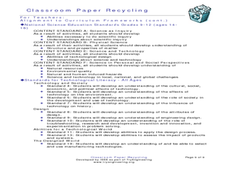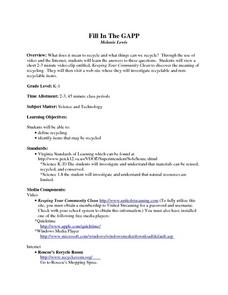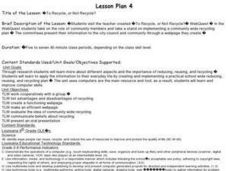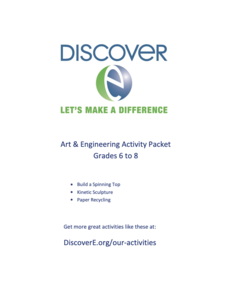Core Knowledge Foundation
Taking Care of the Earth Tell It Again!™ Read-Aloud Anthology
A read-aloud anthology closely examines human impact on the Earth while boosting reading comprehension skills. Through stories, scholars examine the concepts of natural resources, pollution, garbage, and recycling and brainstorm...
PricewaterhouseCoopers
Waste and Recycling: Recycling Paper
We take paper for granted, while thousands of trees are being made into the paper we toss in the trash. Start a dialogue about paper reduction and recycling in class, and share the negative effects paper production has on our...
PricewaterhouseCoopers
Waste and Recycling: Recycling and Energy Recovery
Reduce, reuse, recycle, and recover. Young environmentalists learn about the overwhelming amount of garbage produced and discover better ways to minimize their impact on Earth by learning the difference between garbage and...
Cal Recycle
Conserving Natural Resources
Trying to plan an engaging elementary science unit on natural resources? Conserve your energy! This five-part series of lessons and hands-on activities has exactly what you need to teach young scholars about the importance of conservation.
Wild BC
Climate Change Bingo
Here is a 20-box bingo card to use when exploring ways that humans impact the environment. Various environmentally aware activities are listed in the boxes, and learners circulate the room to find someone who practices the different...
Institute of Electrical and Electronics Engineers
Classroom Paper Recycling
After reading about the history and recycling of paper, creative crafters collaborate to think of a new process for making recycled paper. A complete teacher's guide and student worksheets are included. There is no written procedure for...
Curated OER
Sorting Plastics For Recycling
First, young chemists practice polymer identification by density and flame tests. With the data collected, they propose a method of separating polyethylene from other plastics and determine what property makes it desirable for recycling....
Curated OER
Fill In The GAPP
Youngsters discover what recycling is and identify things that can be recycled. They use both video and Internet resources to aid them in their study. This is a well-designed lesson with excellent activities and a nicely-written letter...
Curated OER
To Recycle, or Not Recycle?
To recycle or not to recycle, that is the question. Your class can find the answer by taking a teacher created WebQuest, where they assume a role of a community member taking a stand on implementing a community wide recycling plan. The...
Curated OER
Turning the Tide on Trash: Marine Debris Curriculum
Seven pages of fascinating reading on marine debris preface the activities in this lesson plan. Four different activities are employed to simulate how the debris is distributed in the ocean and along beaches. Early ecology learners...
Curated OER
"Lettuce" Learn About the Water Cycle
Young scientists investigate the water cycle through a lettuce seed experiment. For this experiment, learners plant lettuce seeds inside of a ziplock bag in order to create a small greenhouse. They observe condensation and precipitation,...
Curated OER
Environmental Benefits of Recycling
Fourth graders understand the benefits of recycling. In this recycling literacy lesson, 4th graders read an article and identify the main idea. Students understand the process of transfer to the landfill and discuss how recycling helps...
Curated OER
Solid Waste Recycling
Students seek scientific and technological solutions to envrionmental problems. They record class activities in a journal. They identify relationships among living things and their environments.
Curated OER
Earth Day Number Sense
Elementary schoolers count and order objects using numbers 1-300. They bring recyclable items from home. Students group the items, skip count by 2's, 3's, and 5's, and arrange the items on a number line. Recyclable plastic bags are put...
Beyond Benign
Recycling Polylactic Acid
Show your class how to recycle during this simulation with polylactic acid. Pupils use a plastic cup, made of PLA, and convert it into a cleaning solution. They conclude the activity by using the newly made cleaning solution to...
Beyond Benign
Evaluating Sustainability and Lifecycle
What makes one product greener than another? Ecology scholars analyze sustainability and lifecycle through a thought-provoking activity. Individuals pick a product, then examine its components to determine its overall impact on the world...
British Council
Upcycling
It's time for a new life! Scholars learn what it means to give products new life by upcycling. They complete a crossword puzzle, read and discuss an article, and play a game about upcycling ideas.
PBS
Going Green
Trash is where it's at! Using bags of garbage collected from the school, learners sort the contents into categories based on type of material and collect data on the results. The data may include weight, volume, and/or percent of the trash.
Museum of Science
Recycled Paper
Watch paper form anew. Scholars take part in an activity where they create new decorative paper from used white and colored office paper. They use a blender to make a pulp slurry, then place it into molds to form the paper. They learn...
Missouri Department of Elementary
I’m A Star!
A lesson encourages scholars to be star community members. Pupils take part in a class discussion that challenges them to brainstorm at least two ways to show responsibility within one's community. Small groups play a game in which...
American Museum of Natural History
Bio-Benefits
Kick-start a discussion of the importance of biodiversity with a colorful resource that touts the benefits of maintaining healthy ecosystems. The images stress the interdependence of all the elements of an ecosystem.
American Museum of Natural History
If Trash Could Talk
Trash can talk! Young archaeologists dig through their trash to see what it reveals about their lives. After they examine their midden, links permit users to test their knowledge of archaeology with a 10-questions quiz, learn how...
Minnesota Department of Natural Resoures
Tree Life
The life of a tree is the focus of a packet consisting of several activities all covering a different subject. Second graders measure shadows, make pinecone critters, write poems, count rings, complete a word search, play tree tag, and...
DiscoverE
Art and Engineering Activity Packet: Grades 6-8
Build an appreciation of engineering. Pupils in grades 6-8 learn about science and engineering in a set of three engaging activities. They build spinning tops, construct wind structures, and create recycled paper as part of an engaging...

























